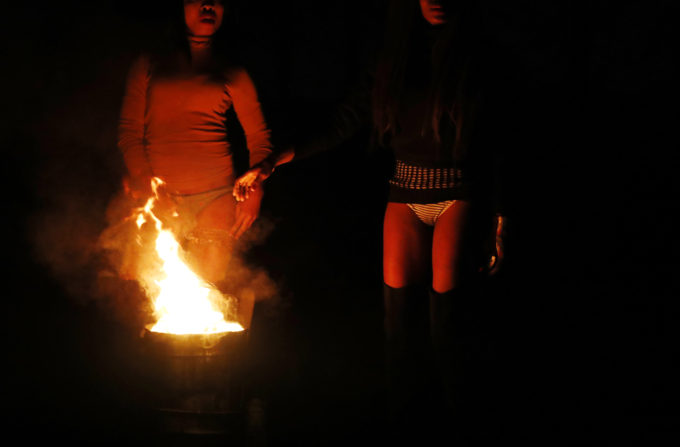
Dear Blog Readers,
I have been working for months on a long story for AP on the tens of thousands of Nigerian girls who are victims of sex trafficking to Italy. AP finally came out with the story for International Women’s Day on March 8th. Here are the links:
TV VERSION:
https://vids.press/ap-archive/only-on-ap-italy-failing-to-help-migrants-trafficked-as-sex-slaves/
WIRE VERSION:
https://www.apnews.com/df4b0f007cd7475e90754e99189f5572
This past week I participated in a discussion about my colleague Barbie Latza Nadeau’s book on the topic “Roadmap to Hell: Sex, Drugs and Guns on the Mafia Coast”, at the University of California’s Study Center in Rome. I was impressed by the great interest in the subject and the number of excellent questions coming from both students and professors. For that reason, I have decided to publish on this blog a longer version of what I wrote for AP in the hope that it can answer some of the questions that were asked.
Preparing the cross-format (wire, TV, Photo) story for the Associated Press turned out to be an ethical challenge, forcing my AP colleagues and me to face some unexpected dilemmas. How do you film/photograph trafficked girls/prostitutes on the street without revealing their identity? If you do film them, how do you know for sure they are from Nigeria? How do you protect their identity if they agree to be interviewed on camera? How do you handle the question of names and ages when you know that to protect themselves they give you false ones? How do you report on the grim, graphic details of their experiences?
When we started working on this story, I got to know some Nigerian girls at a safe house near Rome and first wrote about one of them on this blog, see PRECIOUS CARGO . Around that time we began filming/photographing them on the streets around Italy. I eventually began to feel guilty about this. The girls worry about police picking them up and deporting them or perverts harassing or harming them. So, cars driving past filming or stopping a short distance away and filming was another form of harassment. We eventually tried a different tactic, we went up and spoke to them, told them we were doing a news story on their situation and asking them their names, ages where they came from (almost all from Benin City, Edo State, Nigeria) and their stories. At first I was surprised at how open and accepting of me these girls were. They were not afraid or bothered. Their stories all had a common thread — the departure from Nigeria following a Juju ceremony, the hair-raising journey across the desert, the harrowing months getting abused, raped in camps and detention centers in Libya and the frightening trip across the sea, and then the spot on the road. After all that, a journalist approaching them on the street was no big deal.
Here is the story:
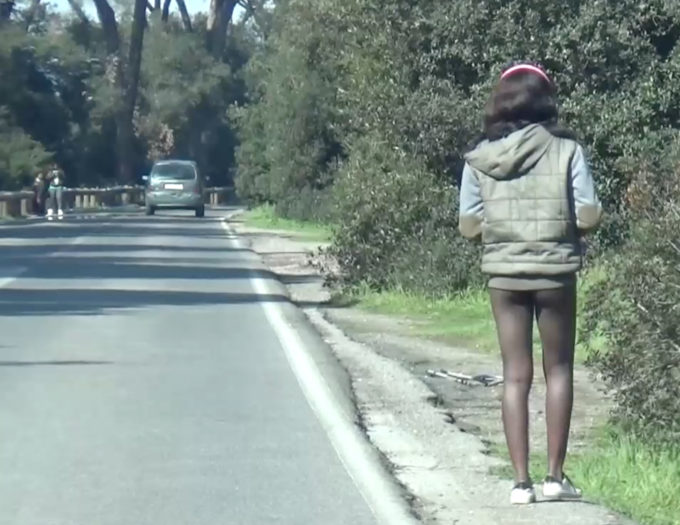
A young Nigerian girl, barelegged in freezing temperatures, stands by the side of the road in Rome wiggling her backside to passing cars in an attempt to attract clients. She says her name is Jessie, that she is from Nigeria and she is 24, but she looks like a teenager. Jessie is one of tens of thousands of Nigerian girls who sell their bodies on the streets every day in Italy risking physical abuse and disease as they work in squalid, perilous conditions.
While Italy has managed to stem the flow of migrants from Libya over the past year, the country has had little success in helping young Nigerian sex slaves living in debt bondage.
Officials from the Catholic Charity Caritas, which provides extensive assistance to migrants, say there are between 10 to 30,000 Nigerian prostitutes on Italian roads and an increasing number are between 16 and 24 years old. Their age makes them more vulnerable to the traffickers lies and blackmail. Italian government figures show roughly 700 Nigerian girls and women were rescued in 2016, a minuscule number compared to the total on the street.
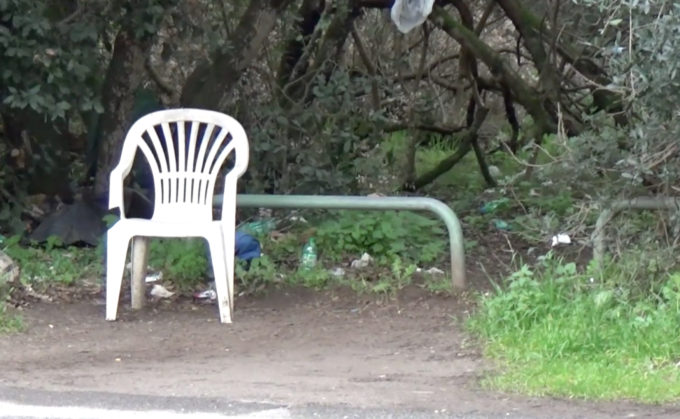
“Their young age does not allow them to understand the true risk that they are facing,” Oliviero Forti, the Director of Migrant Policy for Caritas told the Associated Press, if any of them might have imagined that they would end up working as a prostitute, certainly “no one could imagine how this would be carried out, under threats, violence, abuses perpetrated by the traffickers, a form of true slavery.”
On most days around cities in Italy, it is easy to find roads lined with Nigerian girls and if one stops to hear their stories, they are all similar. Precious, the name she used on the street, was among the Nigerian girls who arrived on a migrant boat in 2016 after a surviving a year’s journey across northern Africa with nothing but the clothes on her back.
During that year she watched others around her die; she was obliged to have sex with dozens of men; and she spent periods without food and water. She was held in connection houses, prisons, and detention centers where men fired guns at random and raped women at will. She doesn’t know how to swim but survived a boat sinking and was brought back to Libya and thrown in prison.
When she finally made it to Italy, she was delivered to a Nigerian Madam who told her, “Precious, you don’t have any choice, this is what is going on, this is how it is going to be. You need to prostitute.”
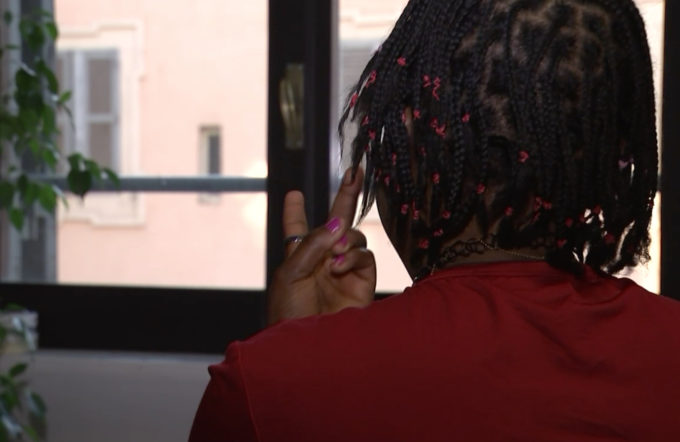
At age 17 she began working on the road in the middle of winter. Her madam provided her with condoms, panty hose and a G-string so “my buttocks would be exposed.” She had to work until she paid back a 20,000 Euro debt.
Precious described to AP how she felt, “I just arrived, I don’t know where to go, I was very confused, frustrated and I wonder is this the life I am planning for myself? Is this how I am going to end it?”
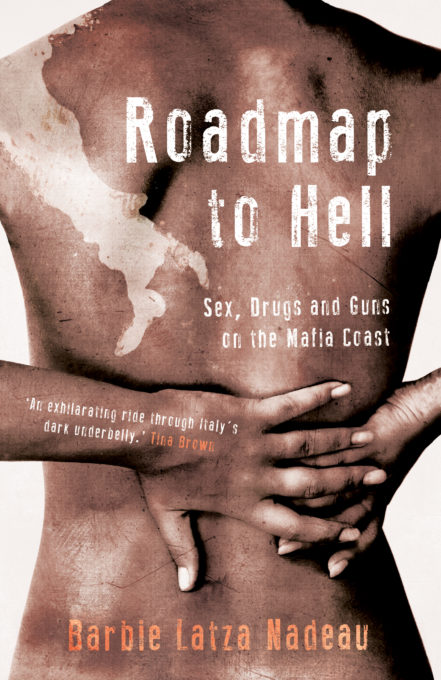
Author Barbie Nadeau spent several years investigating the conditions of Nigerian girls trafficked to Italy for her recently published book “Roadmap to Hell.” She says girls like Precious are forced to pay up to 35,000 in debt bondage and they are given only one option for earning it: “The going rate for a Nigerian woman for fellatio is 10 to 15 euros, for a simple hand job is 5-10 euros, and for intercourse it is 20 euros. She can charge double if the man doesn’t wear a condom.”
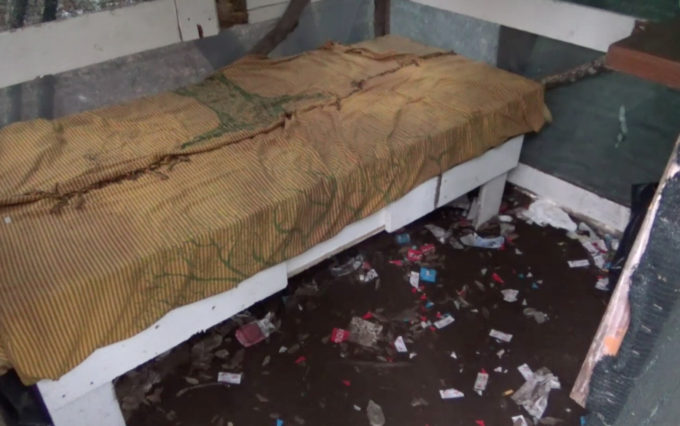
Precious says her Nigerian Madam obliged her to service any client who pulled over in his car– young, old, dirty, smelly or sick. “I had a mattress. It was in the bush,” Precious said, “If a white man came who said he wasn’t going to have sex inside his car, I would take him to my bed.”
She describes her horror when after a sexual relation with a man the condom was filled with blood. When she told this to her Madam, the Madam told her to use red condoms. Other girls speak of condoms bursting and their terror of getting a disease.
Most of the girls have undergone a ritual ceremony called “juju” in Nigeria before they leave. They are told they are under a spell and if they do not pay back the debt to the traffickers they will be cursed.
Twenty-two-year-old Queensy was taken to a shaman who conducted a Juju ritual before she began her journey. She was taken to a cemetery where a shaman made her eat part of a rooster’s heart and took her pubic hair and nails. The shaman cast a spell and told her if she did not pay back her debt once in Italy, bad things would happen to her family, she wouldn’t be able to have children, her stomach would rise up inside her and she could die.
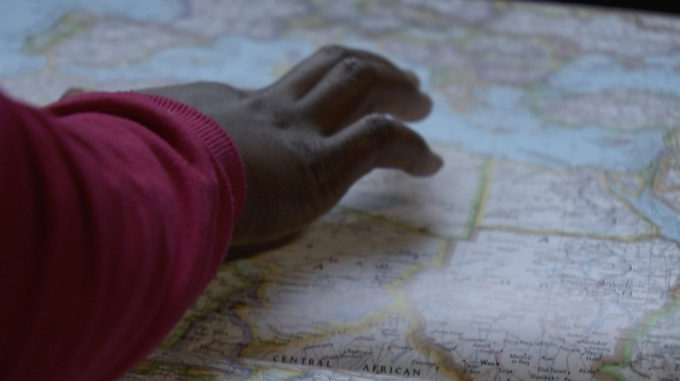
They did not tell her she would have to earn the money to pay back the debt by working as a prostitute on the streets. She thought she would be getting a job as a maid or a nanny in Italy. “When I get to the street and was there, I was very, very angry and I am crying because, I don’t know, I am very small,” Queensy told the Associated Press, “ I look into myself and say, I can’t do prostitution because I am very young, what will I tell my parents, what will I tell my mother, even me too, how will I start it? I don’t know.”
Queensy’s Madam threatened to take her to the police and have her sent back to Nigeria. She gave her no choice.
Precious and Queensy are among the few who managed to escape and are now living in a safe house while Jessie and tens of thousands of others are still on the road.
The money these girls earn is given to their Nigerian Madams who are part of Nigerian gangs who run the trafficking. In some parts of the country, including around Naples, Nigerian criminals have sought protection from the Italian mafia to be able to conduct their business on mob-run territory. Italy’s National Anti-Mafia Investigative Group reported in 2017 that Nigerian gangs reach agreements with Sicilian criminal groups to “obtain protection or at least approval to carry out their exploitation in the form of prostitution.”
Deputy Police Chief Mariapia Marinelli of the National Anti-Crime group says the traffickers are a “transnational criminal organization” with “criminals cells of Nigerian citizens working in Italy.”
According to the UN’s International Organization for Migrants, 11,009 Nigerian women arrived in Italy in 2016, 80 percent potential victims of sex-trafficking. In 2017, the overall number of migrants dropped significantly due to deals made between Europe and Libya to boost the Libyan coast guard and block migrant boats from departing. Nevertheless, 5,425 Nigerian women arrived in 2017 by sea, again, most of them potential victims of sex trafficking.
Forti of Caritas blames the Italian government for a lack of institutional leadership in coordinating efforts to stop the trafficking and help the girls. He says this and a lack of sufficient funds “noticeably lowers the protection of these women and leaves them totally in the hands of traffickers.”
Nadeau shares that concern, “There is no unified strategy whatsoever to combat sex trafficking in Italy. There are no programs that are directed at the clients so that they know what they are purchasing when they buy sex from a young girl from Nigeria.”
While researching her book, Nadeau got a pretty good idea of the range of clients. “The clients of women who’ve been trafficked for sex do not fit into a category,” she explained to me, “They can be bankers, accountants, they can be truck drivers and farmers, they can be young boys who want to experiment, they can be couples who want to experiment; but, I found especially in some of these more popular areas like the Via Domitiana and near Turin that there were a lot of non-Italians who came. I saw vans of German men, I saw three Russian men who had rented a suite in a hotel on the Via Domitiana and had essentially purchased twenty girls to spend the weekend. If you talk to people who live in the area where this forced prostitution takes place a lot of them talk about sex weekends especially in the summer, where people from all over Europe come and take part.”
Italy’s office for Equal Opportunity coordinates the national response to human trafficking and officials there point out that funds for combatting the phenomenon were increased by from 14,3 million euros in 2016 to 22,5 million euros in 2017. These funds are then distributed to the various non-profit, Catholic and local government groups working to solve the problem.
In 2016 they managed to get roughly 700 Nigerian girls and women off the streets and into safe houses, but there are still tens of thousands of the girls who on the street.
“Be Free” is one of the many non-profit groups working to help the Nigerian girls escape sex slavery. Their Director, Oria Gargano, says that the funds to help them are there but the problem right now is finding places for them to go, “At a national level the problem is a lack of places. We want to help as many victims as we can escape, but then we don’t have places for them to stay.”
The Nigerian girls who are victims of trafficking cannot stay in standard migrant shelters according to David Mancini, Assistant Prosecutor in L’Aquila and an expert in trafficking. “The traffickers work inside the centers, recruiting and running their business,” he said. “The girls leave in the morning and come back at night.”
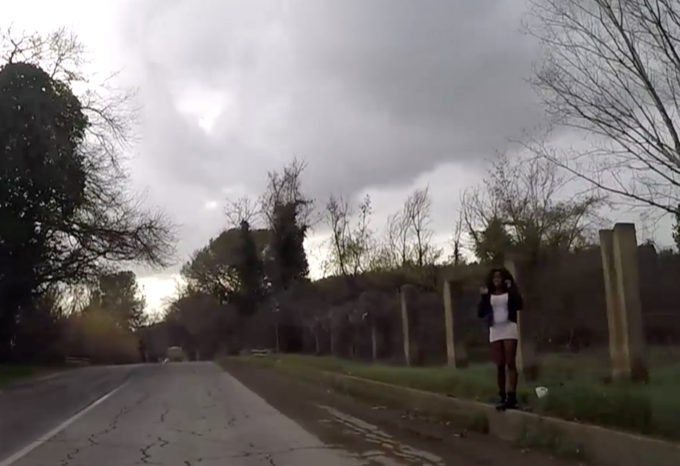
It is no surprise then that the Tiberina, one of the Italian roads lined with Nigerian girls, winds through the outskirts of Rome and leads to a center housing some 800 migrants at Castelnuovo di Porto.
In January 2018, Italy’s consumer protection group, Codacons, issued a report pulling together statistics on prostitution in Italy. It showed an increase in the business of 25.8% from 2014 to 2018, with clients currently estimated around 3 million citizens. The Codacons report said it is a 3.9-billion-euro business with 90,000 women in Italy working as prostitutes.
Forti of Caritas says one explanation for this increase is there are less Italian and Eastern European prostitutes on the road in Italy and many more Nigerian girls who are obliged to do the same sexual acts for much less money, making it accessible for more clients to frequent prostitutes.
On a recent cold February morning Giulia sat in a plasatic chair by a road near Rome looking sad. Unlike the others, she was dressed in jeans and a winter jacket and did not appear to be making an effort to attract clients. She said she is 25, from Nigeria and arrived by the usual route up through Libya and across the Mediterranean. She has been selling her body on the street for the past eight months. She said she gets 10 euros for each sexual act but has not been getting many clients. “Just three a day. Thirty euros is not enough.” She said she wanted to escape but does not know where to go or whom to ask for help.
The Italian government’s Equal Opportunity Office has set up a hotline for women and girls who are victims of sex trafficking, unfortunately it does not work from cell phones run by a Nigerian company called Lycamobile. Most of the Nigerian girls use phones from that company.
If one calls the hotline an assistant provides an address for an office in Rome where a girl can ask for help, but Giulia has no way of getting there. Any money she earns goes straight to her madam. She is trapped.
*******
Since many Blog Readers have asked me in comments or on twitter what they might do to help these girls, I am pasting in a list from the back of Barbie Latza Nadeau’s book “Roadmap to Hell: Sex, Drugs and Guns on the Mafia Coast.”
ORGANIZATIONS IN ITALY WORKING WITH SEX-TRAFFICKED WOMEN
Casa Ruth
www.associazionerut.it
Welcome center and shelter for migrant women alone or with children who are victims of trafficking.
New Hope Cooperative
www.coop-newhope.it
Cooperative sponsored by Casa Ruth with a tailor shop that creates ethnic fashions by migrants and women who are victims of sex trafficking.
Mondo Senza Confini – Centro Miriam Makeba
World cultural center along the Via Domitiana in Castel Volturno dedicated to the memory of Miriam Makeba where cultural events aimed at greater integration and understanding are held.
Slaves No More
www.slavesnomore.it
Catholic association against sexual violence and exploitation and trafficking of women aimed at prevention and integration of victims in society.
Be Free Cooperative Rome
www.befreecooperativa.org
Social cooperative sponsored by the Catholic Church focused on stopping violence against women, sex trafficking and discrimination.
Talitha Kum
www.talithakum.info
Global network of those in consecrated life in the Catholic Church working against trafficking of humans.
Centro Fernandes in Castel Volturno
www.centrofernandes.it
Migrant center sponsored by the Catholic diocese of Capua focused on education, integration, health and legal concerns of the area’s vast documented and undocumented immigrant population. Sponsors Speranza or Hope project for women rescued from the Domitiana.
PIAM
www.piamonlus.org
Organization based in Asti in northern Italy rescuing and assist- ing sex trafficked women.
Community of Sant Egidio
www.santegidio.org
Organization established in 1968 dedicated to the poor and migrant and refugee communities with a special focus on victims of trafficking; working directly with the Vatican.
Jerry Essan Masslo Association
www.associazionejerrymasslo.it
Organization named after a South African migrant, who was murdered in 1989 near Caserta in racist violence at the hands of the Camorra, facilitating integration between African and Italian communities in southern Italy.
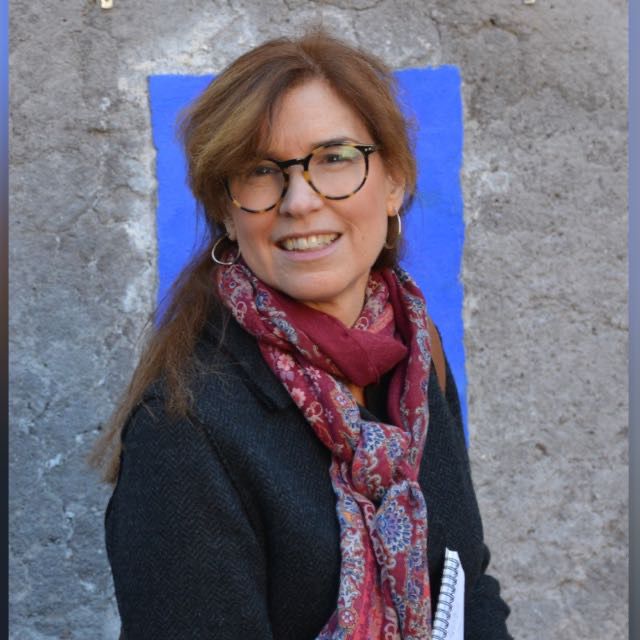
Trisha, thanks for this timely and important piece. It certainly does not appear that Italian authorities are serious about addressing this… cracking a Nigerian mafia seems even tougher than taking down the indigenous mafia… but then, the Nigerian govt seem utterly unconcerned…..
Tom — I can tell you are a journalist… you have pointed out the key areas where I need to do a lot more reporting….the Nigerian Mafia in Italy, the links between the Nigerian Mafia and the homegrown Mafias (Camorra, ‘Ndrangheta, Cosa Nostra) and the role (or lack thereof) of the Nigerian government as well as the role of small groups of activists trying to help in Nigeria.
Hi Trisha
I have followed your amazing blog for years and I appreciate all that you share with us, your followers. Your ideas and energy seem extraordinary!
I am very interested in these prostitues along the roads, my husband and I bike ride a lot and we wonder exactly what they live with. Thanks to you, now we know! I agree, mainly they are strong and seemingly unperturbed, true survivors!
Now a crazy question, if we had a car and they wanted to escape, can we just take them to a center that cares for these girls?
Best wishes to my hero, Trisha?
Diana
Thank you Diane — you ask a very important question that is the key to this whole problem. No, you cannot just tell one of these girls, get in our car and I will take you to a safe house because there are not enough safe houses set up yet for them to go to, so they would risk getting back into a regular migrant shelter and then called up by their traffickers and pushed back out on the street. I think you would have to take them to the police, they would have to make a report against their traffickers/pimps and then the police would have to help them. But they are all afraid of doing that because they are terrified of being deported. You could also help them by getting an organization (one of the ones on the list) to go find them and talk to them on the street and help them go to the police and work their way through the process.
Thank you for this excellent article. While reading I was thinking about contacting you to ask about organisations that help those women, and at the end I discovered I’m not the only want wanting to support them.
Writing about the same issue in Castel Volturno atm. The problem is bigger than ever. Govenment seems to have given up and left the city in the hands of the Nigerian Mafia.
So lovely to read your blog! Thanks!